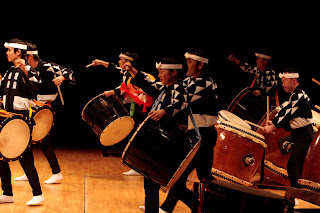Our run-throughs consist of running the entire production whilst in full costume. These costumes, or Happi coats as they are commonly called, are synonymous with Japanese and Japanese-American culture and have a very distinct appearance to them. They are also often seen in Japanese restaurants, being worn by sushi chefs. These uniforms were originally worn in festivals and were later adopted by merchants and in other public domains, often with crests on the back of the coats to display their business or organizations.

 These images are two example of happi coats. The first image (left) is of the professional taiko group KODO. The second image (above) is an example of happi coats typically worn during festivals known as Matsuri and also Obon.
These images are two example of happi coats. The first image (left) is of the professional taiko group KODO. The second image (above) is an example of happi coats typically worn during festivals known as Matsuri and also Obon.The way my group treats and handles these costumes in relation to performance is very interesting. Because taiko is a performance art, the costumes often contribute greatly to the visual aspects of the performance - coordinated colors and designs can add flare to a particular song, especially if the colors and design reflect the mood of the piece.
Our group's view that the audience we play for desires to see us perform in these 'authentic and traditional' costumes contributes to the exoticism of the art and the performance because we are a Japanese group. Now, what I find more interesting is that there are members within the group who are very surprised or shocked upon learning that there are other groups who perform without happi, either because they choose not to, or simply do not own them and they view this as wrong or unusual; however, I find this is somewhat contradictory when we ignore a part of the uniform because people don't like it. This is because the origins, history, and cultural uses for the uniform itself are not taught within our group, and members therefore do not understand why we wear them. My fear is this lack of knowledge and understanding will lead to parts of the tradition dying out, not because I think we are becoming 'less Japanese,' but because people are taking for granted what equipment and luxuries the group has while forgetting that the older generations worked so hard to give us these things. It is really frustrating, and I find it very disrespectful.
These are a few of the things I have noticed and learned from these 'deep hanging out' sessions.
Deep Hanging Out can be found here:
Clifford Geertz. Available Light: Anthropological Reflections on Philosophical Topics. "Deep Hanging Out" p.107-117. Princeton University Press, 2012.
http://books.google.com/books?id= ZEXrndTWc4C&lpg=PA107&pg=PA107#v=onepage&q&f=false
Unfortunately, not all of the pages are accessible, so you might have to find alternatives or buy the book if you would like to read further.